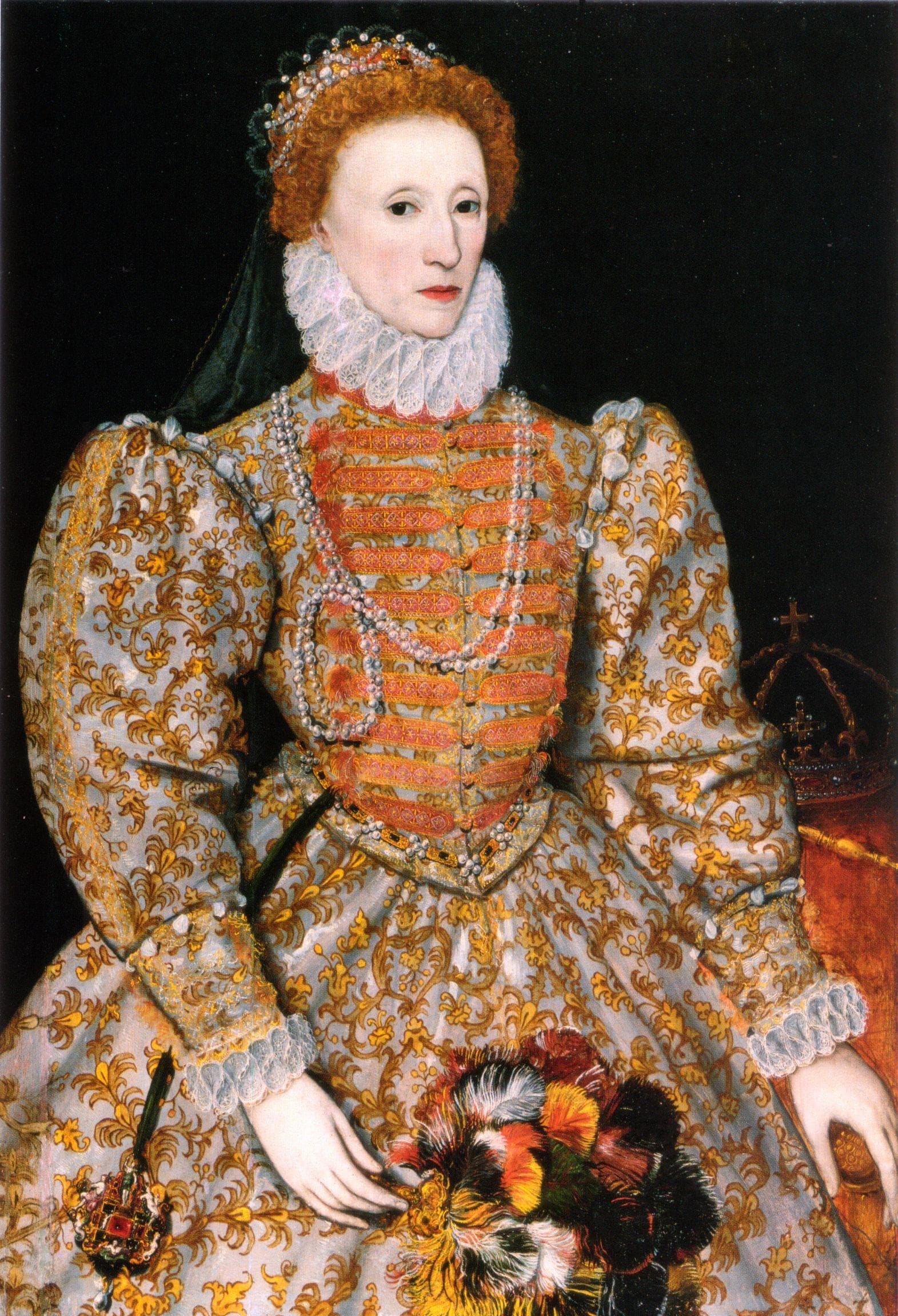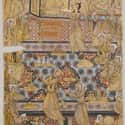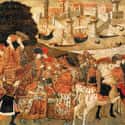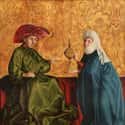-
(#1) She's Often Depicted With Hairy Legs And The Foot Of A Goat
According to Jewish legend, King Solomon hears about the mysterious Queen of Sheba's goat-like hairy leg. He wants to see it for himself and invites the queen to visit him. She resists at first, but ultimately decides to see Solomon in Jerusalem. When she arrives, she brings a large entourage, gifts, spices, and other luxurious goods.
Solomon, still interested in the hairiness he's heard so much about, tricks the queen into showing him her disfigurement. In one version, the king observes the goat-like leg magically transform into a human leg as she walks across the floor in front of him, but in other tellings, he orders his servants to concoct a depilatory that the queen uses to get rid of the hair. After the queen applies the salve, most likely made of lime and arsenic, the king has relations with her.
In some cultures, hair on a woman is associated with lesbianism or the Devil. At times, it's referenced to lessen the importance and power of a woman. In the Bible, hair often appears in the context of physical and intellectual prowess, although this association usually applies to men.
-
(#4) She's Sometimes Depicted As A Witch And A Djinn
In one Jewish and Arabian myth, the Queen of Sheba is a genie or djinn, a half-human, half-demon creature. As a demonic witch, she is associated with Lilith, Adam's first wife according to The Alphabet of Ben Sira. Lilith, the Queen of the Demons, also has origins in pre-Christian traditions and was vilified throughout the Middle Ages as a dangerous temptress.
Both Lilith and the Queen of Sheba are seductresses in Jewish tradition, but they are also celebrated as feminists. According to lore, Lilith and the Queen of Sheba are self-sufficient women who don't need men to support them, nor do they let men control their destinies.
Jewish legend depicts the Queen of Sheba as an able ruler who demonstrates intelligence and cunning. Ethiopians also identify the Queen as one of the first rulers of the nation of Ethiopia.
-
(#2) In The Bible, She Visits Jerusalem To Test King Solomon's Wisdom
In the Bible, the Queen of Sheba hears about the wisdom of King Solomon and wants to put it to the test: "She came to test Solomon with hard questions. Arriving at Jerusalem with a very great caravan... she came to Solomon and talked with him about all that she had on her mind. Solomon answered all her questions; nothing was too hard for the king to explain to her."
The queen likes what she hears and is in awe of the king's thriving kingdom. She tells Solomon that he has the Lord's support and approval and gives him "gold, large quantities of spices, and precious stones. Never again were so many spices brought in as those the Queen of Sheba gave to King Solomon." She becomes a follower of Christianity, an action that may explain the historical origins of the faith in Ethiopia.
-
(#3) The Second Targum Of Esther Includes The Riddles Posed To Solomon
In the Jewish tradition, there is a collection of homilies on the Book of Esther called the Targum Sheni, or Second Targum. The targum contains the questions the Queen of Sheba supposedly asks King Solomon to test his wisdom.
The first riddle asks, "What is a well of wood, a pail of iron which draws up stones and pours out water?" Solomon replies that it is a tube of makeup.
The second riddle asks, "What is that which comes from the earth as dust, the food of which is dust, which is poured out like water, and which looketh toward the house?" Solomon chooses naphtha, a flammable oil.
The final riddle asks, "What is that which precedeth all, like a general; which crieth loudly and bitterly; the head of which is like a reed; which is the glory of the rich and the shame of the poor, the glory of the [passed] and the shame of the living; the joy of the birds and the sorrow of the fishes?" The answer: flax.
In other versions of the exchange between the Queen of Sheba and Solomon, she states, "Seven depart, nine enter; two pour, one drinks." The king responds, "Seven days of woman's uncleanness, nine months of pregnancy; two breasts of the mother at which the child is nourished."
The Queen of Sheba then posits, "A woman saith unto her son, 'Thy father is my father, thy grandfather my husband; thou art my son; I am thy sister.'" The king's answer: "This mother is one of the daughters of Lot, who were with child by their father."
In every version, Solomon's answers are satisfactory to the queen.
-
(#7) There Is Controversy Surrounding Her Actual Identity
Part of the controversy over the Queen of Sheba and her identity is her lack of a name. In Jewish texts, she is described as the Queen of the land of Saba, something that carries over into Christian writings, as well. Saba was an ancient kingdom located in southwestern Arabia that featured heavily in the trade relationships among ancient kingdoms and cities.
Early Christian writer Josephus calls her the Queen of Egypt and Ethiopia. The Quran also discusses the meeting between the Queen of Sheba and Solomon. Islamic writers refer to her as Balkis and identify Sheba as a kingdom in Yemen.
The Queen of Sheba finally gets a name of her own in the Ethiopian Kebra Nagast. The 14th-century text calls her Makeda, ruler of Ethiopia and Saba, a formidable woman and the mother to a son who represents a blend of African, Arabian, Jewish, and Christian culture, as well as politics and economics.
-
(#11) Her Son Brought The Ark Of The Covenant To Ethiopia
In the Kebra Nagast, when Menilek returns to Israel to find his father, he takes with him a ring that Solomon gave to the Queen of Sheba during their time together more than two decades earlier. Upon his arrival, Menilek presents the ring to Solomon, and the king receives him with open arms.
Menilek stays with Solomon for years studying the Torah. When Solomon asks Menilek to take over as king upon his death, he declines, insisting that he needs to return to Ethiopia.
Solomon orders the first-born sons of all of the noblemen in his kingdom to accompany Menilek on his return to Ethiopia. Before the group leaves Jerusalem, one of the sons steals the Ark of the Covenant and replaces it with a replica. Menilek wants to return the Ark to Jerusalem but ultimately decides it is God's will for him to take it to Ethiopia. Solomon is deterred from going after it when a dream tells him the Ark should be in Ethiopia, as well.
In the end, Menilek enters the Ethiopian capital of Aksum with the Ark, where it is placed in a temple. According to Ethiopian lore, it still remains there today.
New Random Displays Display All By Ranking
About This Tool
Queen of Sheba is a religious character mentioned in the "Bible · Old Testament". According to legend, she was the queen of Arabia, she was wise and resolute, had a sweet relationship with King Solomon and had a son. Queen of Sheba was a half-human, half-demon woman in the bible. In the culture of non-Christian beliefs, the image of Queen Sheba is vilified. In the popular folklore of many countries, the Queen of Shiba is more often portrayed as a beautiful, intelligent woman.
The existence of the Queen of Shiba in history is still a mystery. However, long-term investigations and new archaeological discoveries prove that the ancient kingdom of Hiba did exist. The Bible and some other religious documents also mention this queen many times. The random tool shares 11 details about her legend.
Our data comes from Ranker, If you want to participate in the ranking of items displayed on this page, please click here.













